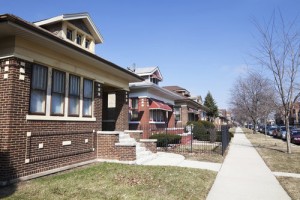
The Chicagoland area had a slow January for home sales, but that may not be a bad thing for the market overall.
Detached single-family home sales in the metro area took a 12.1 percent hit in January over a year earlier, per a new report by the Mainstreet Association of Realtors.
The silver lining: Inventory, which has been squeezed in many submarkets, got some relief.
“As inventory declines level off, buyers are likely to find more options to choose from, easing what has been a chronic market challenge in the past few years,” said Ed Neaves, Illinois Realtors president-elect.
Midwinter, though, is never a great time for sales in Chicagoland—particularly in a year that included a record-breaking cold snap during the month.
“January is one of the lowest sales months of the year,” MORe president Mike Gobber said in a press release. He noted that 1,755 home sales closed during the month, while a typical number during springtime is 6,000 in a single month.
But don’t reach for the panic button. The number of homes that went under contract in January was actually up by 3.6 percent over last year — a sign that momentum toward a busy spring season may have already started. Several suburbs have bucked the trend of a slower-than-expected January and are showing surging sales. Those include Mt. Prospect and Park Ridge, which both show sales in January up more than 50 percent over a year earlier.
Closed sales in the city came to 1,327 in January, down 8.1 percent from a year earlier, when there were 1,444 contracts signed. The median price in January was $252,500, a 4.7 percent drop from $265,000 in January of last year, according to data from the Chicago Association of Realtors.
Chicago Association of Realtors president Tommy Choi situated the soft January numbers in a broader national context. “Consumer confidence throughout the U.S. declined in December and January, due to the government shutdown, the slowing rate of job growth and overall uncertainty about the direction of the economy, resulting in declines in closed sales for January,” Choi said. “Sellers responded by lowering prices slightly to incentivize cautious buyers, who are regaining some power.”
Chicago was hardly an outlier nationally in January. Existing home sales across the country–including in places with much warmer climates–were down 8.5 percent over a year earlier, according to the National Association of Realtors.
Lawrence Yun, NAR’s chief economist, expects the shifting economic conditions, which are manifesting in slow sales this winter, to help loosen up the logjam that has kept many from being able to buy. “Existing home sales in January were weak compared to historical norms; however, they are likely to have reached a cyclical low,” Yun said in a NAR press release. “Moderating home prices combined with gains in household income will boost housing affordability, bringing more buyers to the market in the coming months.”